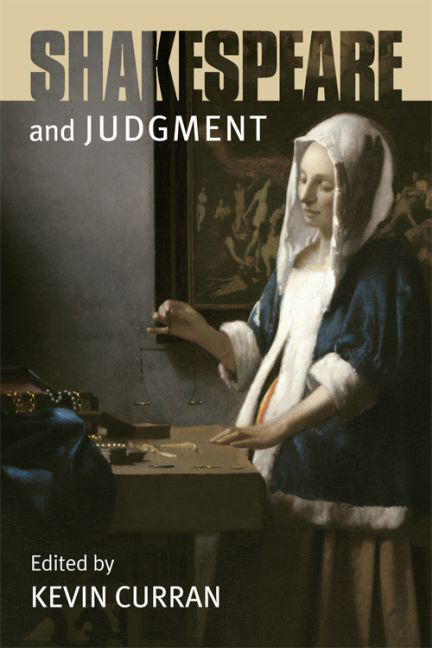Book contents
- Frontmatter
- Contents
- Acknowledgments
- List of Contributors
- Introduction
- Part I Staging Judgment: Deliberation in the Plays
- Part II Audience Judgment: Deliberation in the Theater
- 4 “Gently to hear, kindly to judge”: Minds at Work in Henry V
- 5 “Practis[ing] judgment with the disposition of natures”: Measure for Measure, the “Discoursive” Common Law, and the “Open Court” of the Theater
- 6 The Laws of Measure for Measure
- 7 Prospero's Plea: Judgment, Invention, and Political Form in The Tempest
- Part III The Ethics of Judgment
- Index
4 - “Gently to hear, kindly to judge”: Minds at Work in Henry V
from Part II - Audience Judgment: Deliberation in the Theater
Published online by Cambridge University Press: 10 May 2017
- Frontmatter
- Contents
- Acknowledgments
- List of Contributors
- Introduction
- Part I Staging Judgment: Deliberation in the Plays
- Part II Audience Judgment: Deliberation in the Theater
- 4 “Gently to hear, kindly to judge”: Minds at Work in Henry V
- 5 “Practis[ing] judgment with the disposition of natures”: Measure for Measure, the “Discoursive” Common Law, and the “Open Court” of the Theater
- 6 The Laws of Measure for Measure
- 7 Prospero's Plea: Judgment, Invention, and Political Form in The Tempest
- Part III The Ethics of Judgment
- Index
Summary
In the tavern scene of 1 Henry IV, Falstaff and Prince Harry enact a “play extempore” as a rehearsal for Hal's royal beratement the following day. Falstaff prompts the prince, “thou wilt be horribly chid tomorrow when thou comest to thy father. If thou love me, practise an answer” (2.5.340–1). Harry is perfectly happy to play along: “Do thou stand for my father, and examine me upon the particulars of my life” (2.5.342–3). The critical attention is supposed to be on Harry, but true to form, Falstaff steals the show – the scene's ebullient humor depends on the fat knight's self-inflation and subsequent rebuke. Playing the king, Falstaff sings the praises of that “goodly, portly man” (2.5.384) with whom the prince spends so much time, then Harry, playing the king, lays into “that bolting-hutch of beastliness, that swollen parcel of dropsies, that huge bombard of sack” (2.5.410–11) and so on, forging a brilliant chain of metonymns with which to adorn the lord of misrule. While the rhetorical elaboration of Falstaff's character makes for delightful theater, it is something of a red herring, because the real point is to practice judging Harry. When the sparring partners switch roles, Falstaff is forced into a different rhetorical position, exchanging a braggart's pride for a supplicant's plea. But even after the switch, Harry's position remains constant: standing before his father's throne of judgment, he is everywhere pointed at and complained of as an “ungracious boy” (2.5.406).
Framing this metatheatrical scene are Mistress Quickly and the tavern patrons, the members of the onstage audience, who are not openly judging the prince but the performance and judging it favorably. Even as Falstaff assumes the part of a king/father judging his wayward prince/son for his bad behavior, he simultaneously anticipates his own acting being judged. And he knows exactly what prop he needs to help him play the part convincingly: “Give me a cup of sack to make my eyes look red, that it may be thought I have wept; for I must speak in passion, and I will do it in King Cambyses’ vein” (2.5.350–2).
- Type
- Chapter
- Information
- Shakespeare and Judgment , pp. 93 - 114Publisher: Edinburgh University PressPrint publication year: 2017

